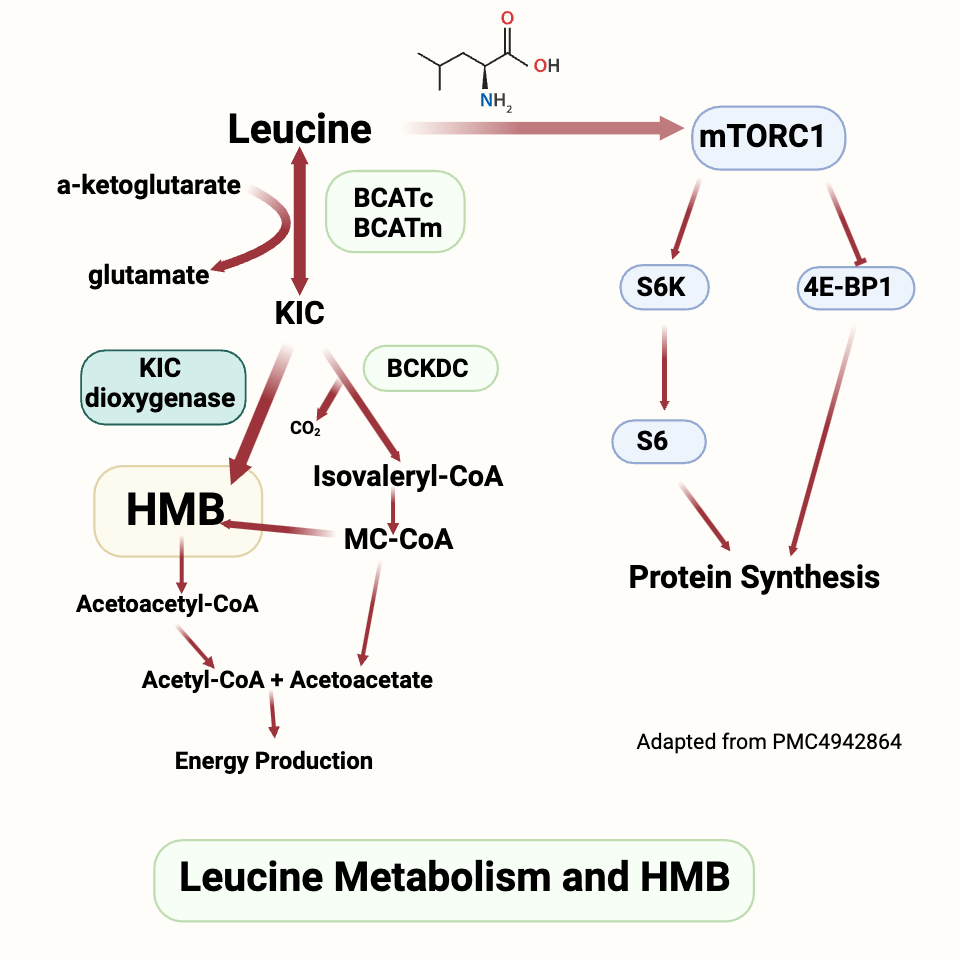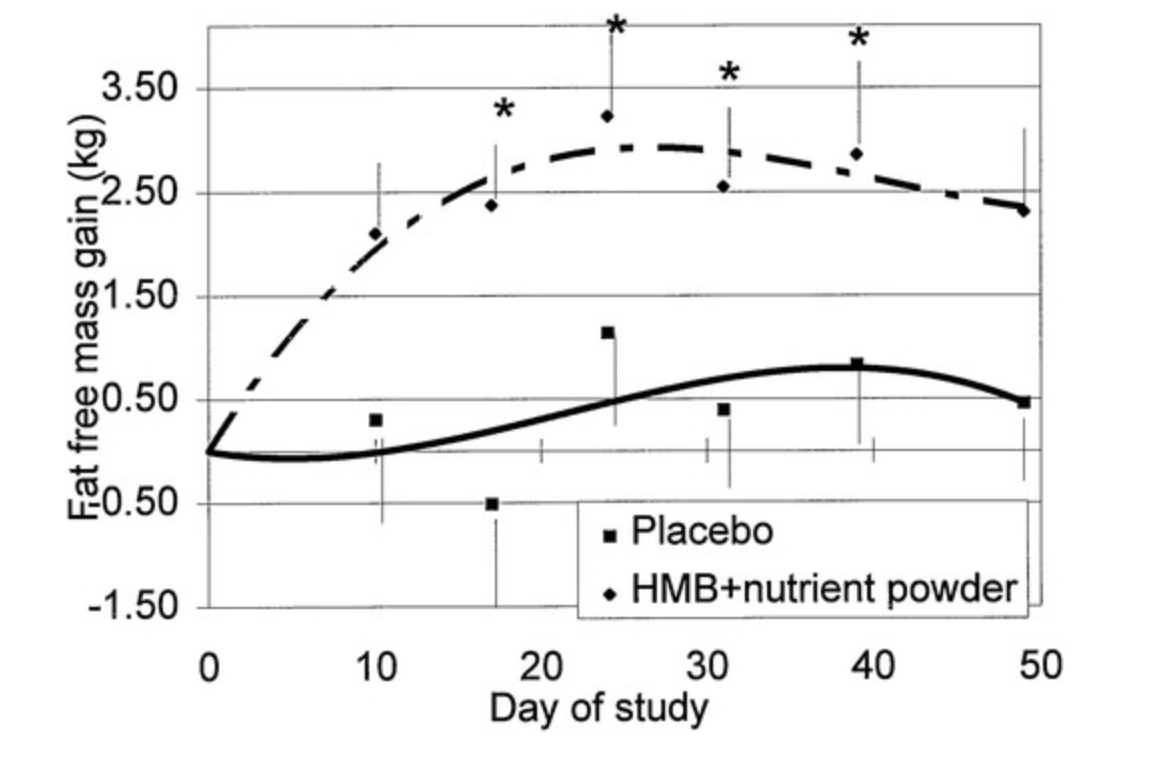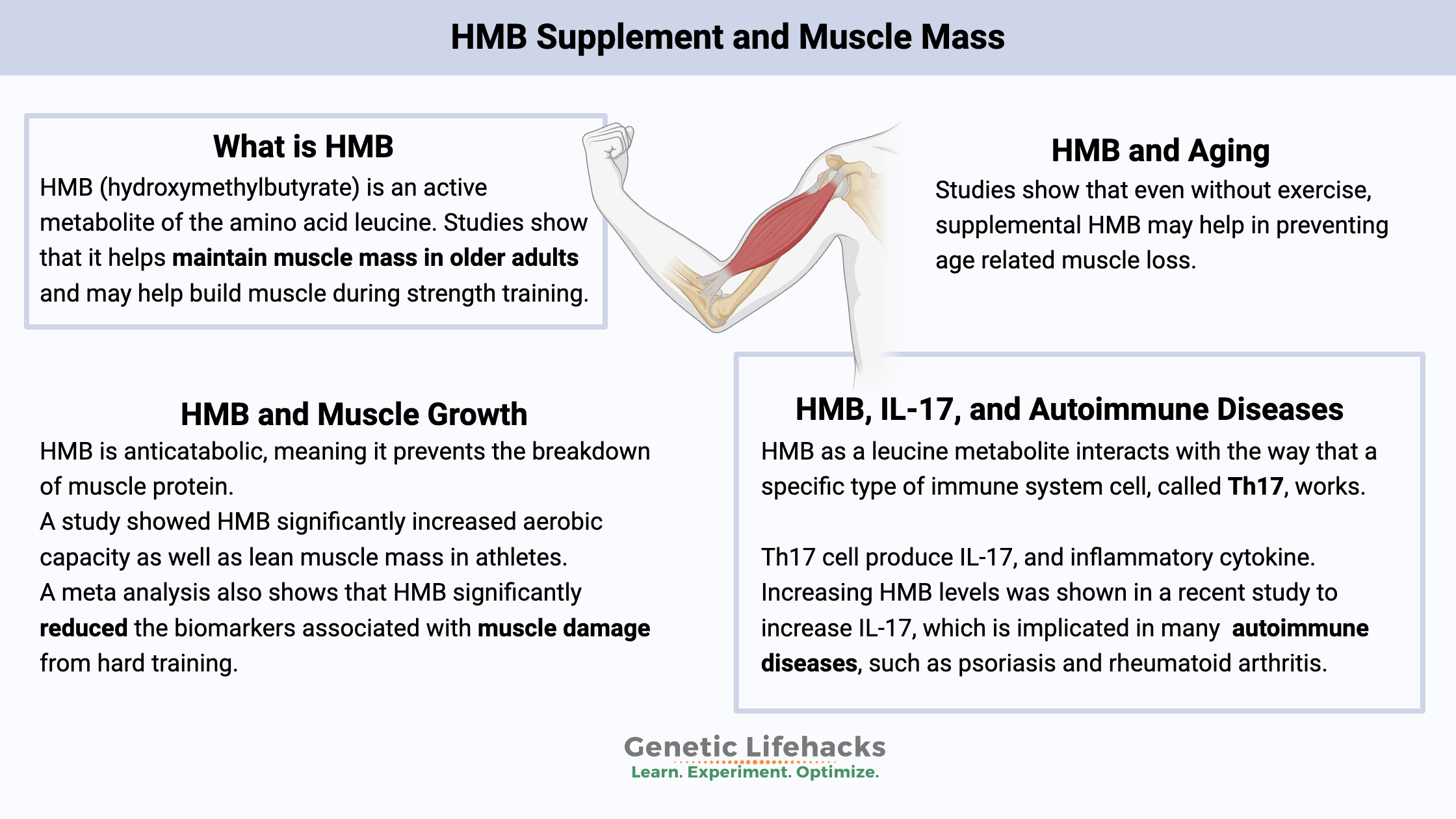Key takeaways:
~ HMB is a dietary supplement that helps prevent muscle loss associated with aging and cancer.
~ It is a metabolite of leucine and protects against muscle breakdown while also promoting muscle growth.
~ HMB isn’t just for gym rats and bodybuilders, it has serious implications for maintaining muscle mass as we age.
What is HMB?
HMB (hydroxymethylbutyrate or ꞵ-hydroxy ꞵ-methylbutyrate) is an active metabolite of the amino acid leucine. Studies show that it helps maintain muscle mass in older adults and may help build muscle during strength training. Essentially, HMB is anticatabolic, meaning it prevents the breakdown of muscle protein. It has also been shown to improve aerobic capacity.
Let’s dive into the science of how it works and look at the study details…
Leucine to HMB:
Leucine is an essential amino acid, meaning it can’t be synthesized by the body and instead must be obtained from foods. It is used in the body in multiple ways, including for protein synthesis and muscle growth through activating mTORC1, which is like the body’s master switch for growth. Leucine is also important for gluconeogenesis and metabolic health.[ref]
HMB (ꞵ-hydroxy ꞵ-methylbutyrate) is derived from leucine using the enzyme KIC dioxygenase, which is also known as 4-Hydroxyphenylpyruvate dioxygenase (HPD gene). In this process, leucine gives up an amino group to α-ketoglutarate to form glutamate and α-ketoisocaproate (KIC). KIC is then further metabolized to HMB, which is important because it is anti-catabolic, meaning it stops the catabolic breakdown of muscle.[ref][ref]
Anabolism is the process of building molecules — think anabolic steroids and muscle building. Catabolism, on the other hand, is the breaking down of molecules into smaller ones. In the body, this is usually done to release energy. The fact that HMB is anti-catabolic means that it stops the breakdown of muscle. This is important not only for building muscle mass in weightlifting, but also for stopping the loss of muscle in cancer and aging.
I mentioned above the HMB is a metabolite produced from leucine by KIC dioxygenase. Here’s the full pathway:[ref]

The body produces small amounts of HMB. A 2017 study showed that HMB production in muscle, liver, and adipose tissue in older adults accounts for less than 1% of leucine turnover[ref]
Oral supplementation with HMB rapidly increases levels. A study in young men showed that both HMB and leucine supplementation increased mTOR signaling in muscle within 30 minutes for HMB and 90 minutes for leucine. In addition, HMB consumption decreases muscle protein breakdown, independent of insulin.[ref]
What exactly does HMB do in cells and muscles?
PGC-1α regulates mitochondrial biogenesis in skeletal muscle, which is important in the prevention of age-related muscle wasting. HMB activates PGC-1α expression in skeletal muscle, thereby preventing the loss of muscle mass by stimulating mitochondrial function[ref] PGC-1α is encoded by the PPARGC1A gene.
A recent study in mice also identified an interaction between HMB and PPAR-alpha. PPARα is a nuclear hormone receptor involved in lipid metabolism. The study showed that β-hydroxy β-methylbutyrate (HMB) binds to PPARα.[ref]
Studies on HMB and muscle mass.
There have been a number of studies on using HMB as a supplement to either decrease muscle loss or increase muscle gains during exercise.
| Function/Benefit | Evidence & Effect | Details |
|---|---|---|
| Prevent Muscle Loss (Aging, Cancer) | Supported by RCTs | Modest but significant effects in preventing muscle loss in elderly and cancer patients |
| Increase Muscle Mass (Training) | Significant in untrained or new trainees | Best results with 3 g/day; more noticeable in beginners new to training |
| Reduce Muscle Damage | Meta-analyses show lower muscle injury markers | Lower creatine kinase levels and LDH with ≥6 weeks use |
| Enhance Aerobic Capacity | Shown in athletes, more with Creatine + HMB | 12-week and 8-week studies with increased aerobic power |
| Modulate Immune Response (Th17/IL-17A) | Cell and animal studies, mixed implications | Boosts certain immune pathways; effects on autoimmunity remain unclear |
Let’s dive into the details here. Note that these studies all used calcium HMB, which is the form you’ll find in supplements.
Increased muscle growth during strength training:
A study involving healthy adults in their 20s who didn’t regularly lift weights. The participants took either 0, 1.5, or 3g/day of HMB in conjunction with weight training three days a week for three weeks. After 3 weeks, the subjects who consumed 3 g/day of HMB had a significant increase in lean mass compared to those in the placebo group and those in the 1.5 g/day group. The results showed that there was a decrease in exercise-induced muscle proteolysis and plasma creatine phosphokinase levels.[ref]
A second study by the same group enrolled young adult men who regularly engaged in some form of exercise prior to the study. During the six weeks of the study, the men performed strength training six days a week. Half of the participants took an HMB supplement, and the other half took a placebo. The participants who received HMB showed a significant increase in lean muscle mass compared to the placebo group.[ref]

More gains in untrained:
However, not all studies show beneficial results in increased muscle mass. A systemic review of studies in young adults that primarily included studies involving men who were regularly training found that overall mass increased, but there was no statistical benefit for increased strength.[ref] A picture emerges that HMB may be more beneficial when starting out with weight lifting.
Increased aerobic capacity:
A placebo-controlled study in trained combat athletes looked at the effects of HMB (3g/day) for 12 weeks of aerobic and anaerobic training. The results showed that HMB significantly increased aerobic capacity as well as lean muscle mass, compared to the placebo group. [ref] In elite endurance athletes, a placebo-controlled study found that the combination of creatine plus HMB significantly improved aerobic power after 8 weeks.[ref]
Decreased muscle damage:
A meta-analysis of clinical trials using HMB found that supplementation with HMB significantly reduced the biomarkers associated with muscle damage (creatine kinase and lactate dehydrogenase) from hard training. Importantly, the meta-analysis found that it took six weeks or more of supplementation to see the most benefits.[ref]
Preventing declines in aging:
In aging, muscle mass declines, as does physical performance. Stopping age-related muscle loss is important for healthspan and overall wellness in aging. For example, more muscle mass may protect you from falls and from osteoporosis.
A recent double-blind clinical trial in people over age 60 looked at how HMB and vitamin D affect older people’s functionality (strength, lean body mass, movement). The 12-month trial had four arms: control with no exercise, HMB + vitamin D with no exercise, control plus exercise, and HMB + vitamin D with exercise. The study looked at the benefits on body composition, lean body mass, strength, and functionality — which all together the researchers called the functional index. In the group that didn’t exercise but took HMB + Vitamin D, there was an increase in the functional index compared to the control. Adding exercise didn’t improve the functional index compared to control with exercise.[ref]
Preventing muscle loss in cancer:
Cancer patients typically have muscle wasting or loss of muscle mass. Multiple randomized controlled trials have shown the beneficial effects of HMB supplementation on muscle mass in patients with cancer. Two studies also showed a beneficial effect on quality of life, and one study also showed a beneficial effect on tumor response to treatment.[ref] Please talk with your doctor if you are undergoing cancer treatment about whether HMB is a good choice for you.
Immune system, T cells, and HMB:
Amino acids are important for meeting the increased energy needs in activated immune cells, and HMB as a leucine metabolite interacts with the way that a specific type of immune system cell, called Th17 cells, works.
T cells are a type of white blood cell that fights off infectious diseases from viruses, bacteria, and fungi. There are multiple types of T cells that have specialized roles in the immune system.
Th17 (T helper 17) cells protect against specific microbes by producing IL-17, an inflammatory cytokine, when the Th17 cell is activated. IL-17 is important in fighting off specific viruses, bacteria, and fungi, including tuberculosis, whooping cough, pneumonia, Borrelia, and certain fungal infections. It’s one of the heavy hitters in the immune response.
The flip side of Th17 is that dysregulation and elevated levels are implicated in many autoimmune diseases, such as psoriasis and rheumatoid arthritis.[ref]
A recent study in human cell lines shows that HMB increases the production of IL-17A in activated Th17 cells by increasing the expression of HIF1A. When leucine is prevented from being metabolized into HMB, there is an inhibition of Th17 cells and decreased IL-17 production. Importantly, the study noted that the amount of HMB used was similar to levels achieved by oral HMB supplements in humans. [ref]
Does this mean that anyone with an autoimmune disease should avoid HMB and perhaps even go with a low leucine diet? The research here is not entirely clear. A 2024 study in mice pointed to HMB playing a positive role in a mouse model of multiple sclerosis.[ref] This seems contradictory since IL-17 is upregulated in MS, and blocking IL-17 is one treatment for MS.[ref] Thus, the mouse study seems to contradict the study showing that HMB augments IL-17A production.[ref] It’s possible that the difference lies in the mouse immune system being similar to but not the same as humans for Th17 cells in the mouse model of MS. Alternatively, the difference may not be entirely dependent on the IL-17 levels. The mouse study also showed that HMB led to improved integrity of the blood-brain barrier and protected the spinal cord from degradation in the animal model of MS. [ref]
Until studies clarify the results here, you may want to be careful with HMB if you are dealing with an active autoimmune disease.
Side effects, timing, and dosing of HMB:
Supplementing with up to 3g/day in clinical trials showed no adverse side effects.[ref] I also looked through reviews on Amazon for anecdotal side effects because oftentimes, less severe side effects aren’t noted in clinical trials. However, I didn’t find much other than that some people think it tastes or smells bad. A couple of people noted that HMB reduced delayed onset muscle soreness.
How long does it take to see benefits?
A meta-analysis looking at multiple studies on HMB for reducing muscle damage biomarkers showed that taking the HMB supplement for more than six weeks gave greater benefits than short-term studies of less than six weeks.[ref]
Genetic connections:
Access this content:
An active subscription is required to access this content.
Lifehacks:
HMB seems to have modest benefits for athletes who work out regularly, both for improving aerobic capacity and by preventing muscle damage from hard workouts. Faster recovery, better aerobic fitness, and bigger muscles… to some extent. I don’t want to oversell this – it won’t make you look like Swartzenager, but studies do show that it may give you something of an edge with incremental gains.
Maintaining as we age:
HMB isn’t just a supplement for young people who are working out hard. This is a tool that may help everyone maintain muscle mass in aging or in illness. Maintaining muscle mass in aging is essential for preventing falls and having good mobility.
Prevent lean muscle loss during weight loss:
HMB may also be a supplement to consider if you are on a GLP-1 RA medication for weight loss. One side effect seen with GlP-1 medications, such as semaglutide, is the loss of lean muscle mass along with fat mass. HMB may help to maintain muscle mass – along with weight lifting.
Stack with creatine?
A recent review by the International Society of Sports Nutrition explained that nine studies have looked at the combined effect of HMB plus creatine. Three of the studies found no additive effect of combined HMB and creatine on athletic performance, but the other studies found a positive effect.[ref]
Related article: Creatine, genetics, muscle and brain power
Related articles and topics:

